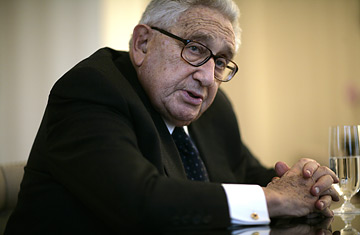
Henry Kissinger speaks during an interview in Washington.
(2 of 3)
What kind of relationship does he want Russia to have with the West?
I don't believe he looks at the West as a unified bloc. Since he conducts foreign policy by his perception of the national interest, he is not beyond exploiting the differences within the West to enhance Russia's position. The idea that Russia will join a democratic community, or even a Western community, is not his principal motivation. What he seeks, above all, is respect for a Russia defining its own identity. In my opinion, he would value friendly relations and cooperative relations with the United States — but on the basis of a clear perception by each side of its national interests and respect for them.
So how would you assess the state of relations between Moscow and Washington?
Putin's personal relations with Bush are very good. When Bush at their very first meeting said he had looked into Putin's eyes and discovered a compatible soul, that was ridiculed in the American press. But to Putin, it was a recognition of equality and eligibility for equal partnernership with the U.S. What he has respected about Bush is that [the President] generally does not lecture him. He does not mind that Bush is tough in his defense of the American national interest, because that is what he expects statesmen to do.
On other levels, there have occasionally been problems. Both sides in theory want to cooperate with each other, but both sides do things which get under the skin of the other. It gets under the Russian skin when we lecture them about their domestic situation. Or when leading Americans ostentatiously meet with opponents of the regime on high-level visits to Moscow. Or when we extend NATO into territories close to the Russian border. We are irritated when Russian leaders don't treat neighboring countries as truly independent. And there are many Americans who have very strong views about the Russian domestic situation. So there are cycles, and some of the issues have a long history.
On the other hand, there is a profound need for cooperation. There is too much of a tendency to treat Russia as if it were a global threat to the U.S. Russia has enormous problems of its own. It has long and unstable frontiers. It has a truly appalling death rate. It has a declining population. And so Russia should not be viewed as a global threat. But it wants to be respected as a significant power. The issue is whether we can develop a constructive relationship with a country whose cooperation we need in relation to Iran and to some extent Iraq and with a Middle East peace settlement. They are also an essential partner for new issues like energy and environment that can only be solved on a global basis rather than competition.
You mentioned Iran. Do you believe that what's come out of the latest NIE report will make it more difficult for the U.S. to convince Russia to maintain a united front with us against Iran's nuclear program?
In my view, the Russians' strategic assessment of the nuclear problem posed by Iran is almost the same as ours. The tactical conclusions they draw for the immediate future are different, however. They differ as to the imminence of the Iranian strategic threat. But if Russians became convinced that the threat were imminent, then we would be together. The question is whether this isn't so late in the process that you can't act meaningfully anymore.